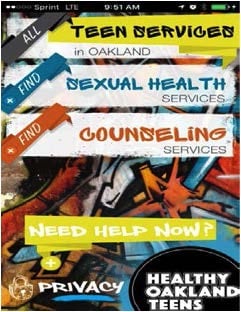Oakland Unified School District’s Healthy Teen Program
Oakland Unified School District (OUSD)’s Healthy Oakland Teens Program is an example of one program that meets these criteria. OUSD implemented a successful campaign to ensure all 6th, 7th, and 9th graders in their district receive evidence-informed sexual health education.
Just as schools are critical settings for preparing students academically, they are also vital partners in helping young people take responsibility for their health. School health programs can help teens adopt lifelong attitudes and behaviors that support overall health and well-being—including behaviors that can reduce their risk for HIV and other sexually transmitted diseases (STDs).
Programs that are most effective in reducing sexual health risk behaviors among teens have several common attributes, which include:
- Being delivered by trained instructors
- Being age-appropriate
- Including components on skill-building, support of healthy behaviors in school environments, and involving parents, youth-serving organizations, and health organizations

- Skill-building
- Supporting healthy behaviors in school environments
- Involving parents, youth-serving organizations, and health organizations
In 2011, the statistics for STDs in Oakland were startling: the rates of gonorrhea and chlamydia were twice as high as the overall county rate.
Also, the California Healthy Kids Survey conducted in 2011-2012 found that 33% of OUSD’s sexually active 7th graders reported rarely or never using a condom.
At that time, there was no consistent approach to sexual health education in OUSD, with some classes focusing exclusively on HIV prevention and other classes only discussing pregnancy prevention. Other important topics, such as LGBTQ health, were generally not addressed.
A group of dedicated OUSD staff decided to change that story. Working together they compiled data, navigated challenges and created a collaborative solution, which was then funded through the Centers for Disease Control and Prevention (CDC).
OUSD is one of 17 local education agencies in the nation that received funding from CDC’s Division of Adolescent and School Health (DASH).
Oakland’s health education curriculum gets an overhaul
The Healthy Oakland Teens program took several initial steps to ensure success from the beginning. The program:
- Reviewed available sex education curricula.
Using CDC’s standards-based Health Education Curriculum Analysis Tool, the program assessed numerous curriculum to see if one would be a good fit for OUSD. - Developed a new sexual health education curriculum.
Finding no curricula that met the unique needs of their students and teachers, Oakland developed their own high school and middle school sexual health education curriculum based on the National Sexuality Education Standards, the California Education code, and science and English Language Standards. - Incorporated expert feedback into the new curriculum following an extensive review from experts in science and education and input from parents and students.
- Integrated sexual health education curriculum into OUSD schools.
The delivery of the OUSD sexual health education program was designed to be embedded into science and English/Language Arts classes. All of the science and English/Language arts teachers received intensive training on the new curriculum and its effective delivery. - Tested new curriculum.
The new curriculum was pilot tested in 2 high schools in 2014, revised, and then implemented at the remaining 15 high schools in OUSD during “Sex Ed Week”—March 9–13, 2015.
A new curriculum debuts to thousands of teens
Over the past two years, 5,000 9th graders received 10 lessons in sexual health education during high school Sex Ed Week. The program also launched an app called Healthy Oakland Teens which connects students to the closest teen clinics and school-based health centers (SBHC).
These clinics and SBHCs provide free youth-friendly STD and HIV testing, sexual assault counseling, mental health counseling, and alcohol and substance use counseling services. Students downloaded the app while receiving the lesson “Legal Rights and Accessing Valid Resources” during Sex Ed Week.
What’s Next
- Healthy Oakland Teens is embarking on its third year of conducting Sex Ed Week for 9th grade students at 18 school sites.
- With a new focus on students in special education classes and those learning English, all students will have accessible comprehensive sex education in Oakland.
In addition, after finalizing the middle school curriculum to reflect the new California Healthy Youth Act, the middle school curriculum was delivered during middle school Sex Ed Week to 6th and 7th graders at 18 school sites in February 2017.
- During their fourth year of funding, the program continues to focus on providing safe and supportive environments for LGBTQ youth by training additional staff and teachers, with an emphasis on nonteaching staff, such as cafeteria workers, administrative assistants, and custodians.
OUSD offers training at every school within the district, not just the selected priority schools as required by CDC/DASH funding.
The program will also continue to market the Healthy Oakland Teens app as a valuable resource to students.

Research shows that well- designed and well implemented HIV/STD prevention programs can decrease sexual risk behaviors among students, including:
- Delaying first sexual intercourse
- Reducing the number of sex partners
- Decreasing the number of times students have unprotected sex
- Increasing condom use